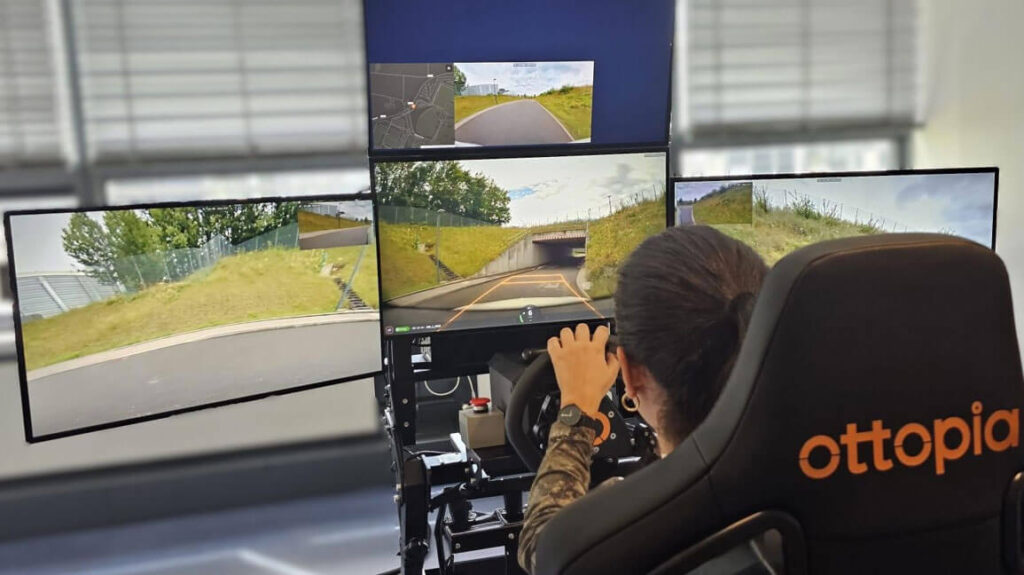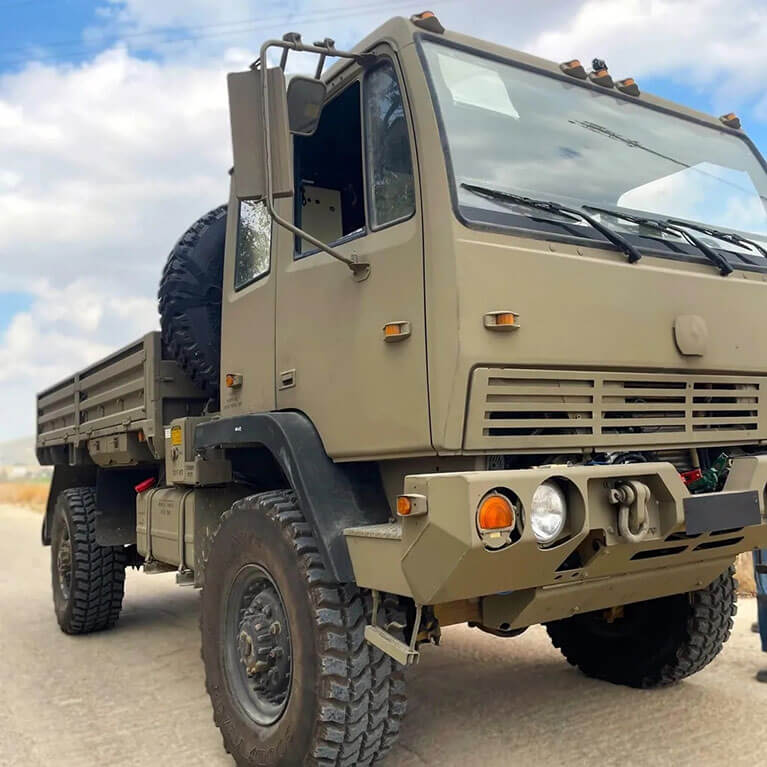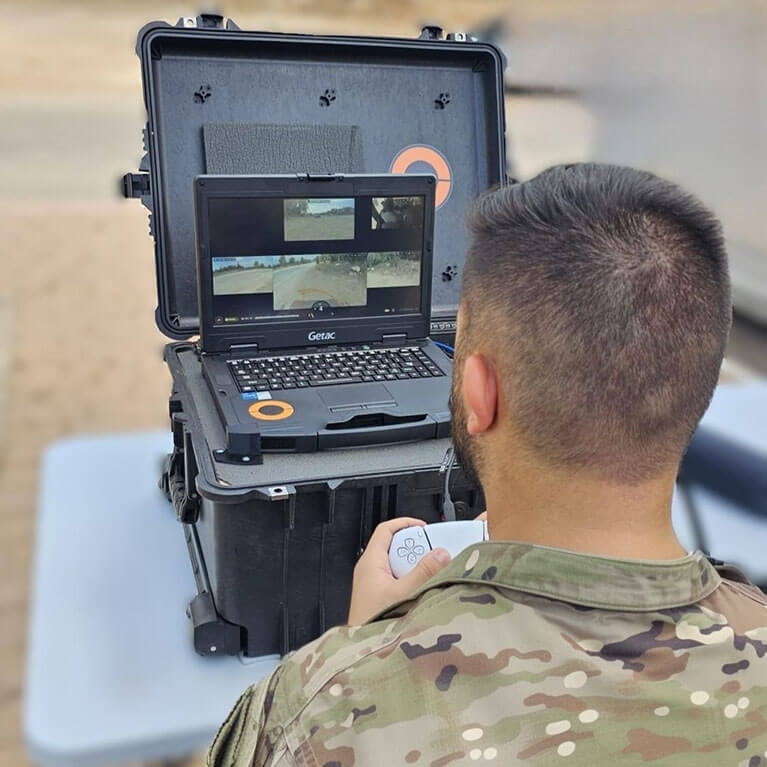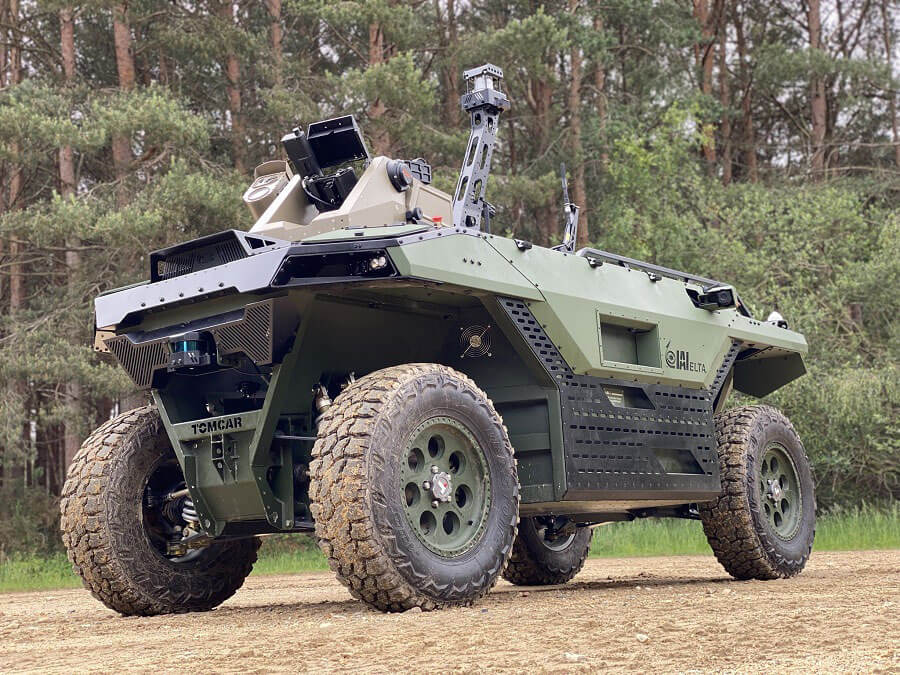The Israeli Defense Forces (IDF), with the help of Israeli technology companies, continue to lead the development and implementation of autonomous systems for combat logistics. While experts predict that fully autonomous weapon systems may still be decades away, Israel has made significant strides to bring more autonomy into combat operations, with a primary focus on logistics.
The Future of Military Robotics: IDF’s Path to Full Autonomy
The buzz word in the Israeli defense establishment is “autonomy.” While various development efforts remain ongoing, achieving the goal of fully autonomous weapons systems will take time in armed forces criteria.
A senior defense official from the Israeli ministry of defense, directorate of defense, research & development (DDR&D) indicated that big advancements in AI will allow the Israeli companies developing military systems to shorten the time until these systems are deployed. This official said, “The special department for AI and Autonomy that was formed within the DDR&D, coordinates these efforts of the relevant Israeli companies. I believe that the effort can be accelerated now and that some fully autonomous systems will get to the field in the coming years.”
But as an intermediate effort, the Israeli Ministry of Defense with some of the Israeli defense industries, have accelerated efforts to bring more autonomy to their prime client, the IDF, as well as to foreign partners. They have channeled first priorities to logistic systems. Logistics spell the difference between winning a war or losing it.

Lessons from Recent Conflicts: The Reality of Logistics’ Importance
As they say, “No plan survives first contact with the enemy.” The Russian invasion of Ukraine provides one of the best real-world examples of this concept as this war has not developed as planned. Although IDF experts continue to analyze the Russian logistics failures, they have come to a few initial conclusions.
Lt. Col. (Res.) Eyal Ziv, former commander of the logistic department of the IDF’s 98 battalion, has contributed to some of the research relating to Russian logistic systems in Ukraine. In a paper he wrote for the official IDF magazine, this experienced logistics expert emphasized that an army prepared for long combat must be capable of feeding its troops beyond the planned duration of combat.
According to Lt Col Ziv, “The Russians probably did not imagine that the fighting would last weeks or months, and the Russians had a great dependence on logistical planning: in Western armies it is customary to supply according to demand, while the logistics in the Russian army are built on supply according to advanced planning.”
In other words, instead of the strategy dictating the logistics in the campaign, the logistics dictated the strategy.
Lt Col Ziv also pointed to another planning failure that apparently contributed to the Russians’ poor organization: the attempt to maintain the element of surprise. He said, “The decision to hide the army’s plans for invasion was aimed to generate disinformation, and confuse the enemy, but among those surprised were the Russian soldiers who were required to fight it.”
These conclusions have informed the various combat logistic systems that Israeli defense companies have developed to support the IDF and other foreign militaries, including the UK Ministry of Defense (MOD).
Remote-Controlled Systems: A Step Towards Full Autonomy
For now and for the foreseeable future, ground robotic systems will remain teleoperated. Autonomy technology works in limited scenarios and environments, with soldiers ultimately still controlling the machines. As autonomy technology improves, soldiers will be able to control a larger number of machines – but soldiers will remain in the loop, relying on teleoperations to connect to vehicles.
In this war, for the first time the IDF has used remote controlled ground systems like D-9 bulldozers and old out of service M-113 armored personal carriers (APC) for combat logistic missions. Israeli company Ottopia has developed a system that enables such remote control of vehicles used by armed forces.
Amit Rosenzweig, CEO of Ottopia, explained that the company’s system transmits high resolution video to the operator of the vehicles and enables very accurate remote control under complicated conditions. “We have now equipped over 100 remotely controlled ground platforms with our system,” Rosenzweig said. “The uninterrupted video stream from the payload attached to the ground vehicle allows them to operate in combat situations. The system enables almost real time responses of the remote operator to fast changing situations.”
Rosenzweig also noted that no army in the world yet relies on fully autonomous weapon systems “We have begun to work on such systems,” he said, “but our main effort is on the remote controlled ones.” He continued, “In some, we have begun to add AI features that, for example, will bring a combat platform back to base in case the communication fails.”
The Ottopia CEO added that logistics may be the first to operate autonomously but at this point in time there is always a man in the loop. “The autonomous technologies have to get more mature to let them fully control a mission,” he cautioned.
That said, several Israeli companies have already successfully demonstrated their autonomous battlefield technologies.

Israeli Companies Leading the Way in AI-Based Combat Logistics
After a long competition in which more than 100 companies took part, the IDF down-selected two Israeli defense companies to demonstrate an advanced AI-based combat logistic system: Rafael and Israel Aerospace Industries (IAI).
These two companies have proposed systems that are based on the experiences of the IDF and lessons learned from the Russian-Ukraine war. All the experts agree that the basic systems offered will enable centralized autonomous operations of unmanned systems on the ground and in the air for combat missions in the future.
Rafael Leverages AI For Military Logistics
A senior Rafael source said that its solution allows the IDF to minimize the number of soldiers on the battlefield and to perform the logistical tasks more efficiently and more safely.
Rafael recently demonstrated its end-to-end system for planning and managing logistic resupply for units deployed on the battlefield. This unique and groundbreaking solution focuses on minimizing the manpower requirement through a fully autonomous end-to-end system of unmanned aerial vehicles (UAVs) and unmanned ground vehicles (UGVs) that perform delivery tasks at the tactical level.
A single operator master mission management system manages and controls the autonomous vehicles. It integrates modern technologies including COMBAT AI, GPS-free navigation and advanced image processing to do this.
The system gathers information from a variety of existing battlefield sources, such as battlefield management systems (BMS) and other command and information systems, as well as from commanders and units in the field. AI algorithms then analyze the information and use it to generate meaningful logistic resupply tasks. This enables the main mission control and management system to select the most appropriate and efficient platforms for each task and plan the respective individual tasks. Simultaneously, the system plans the task from a systemic standpoint.
Each of the platforms then execute the mission autonomously, without risk to human life. During execution, the built-in intelligent algorithms also allow the system to identify and autonomously adapt to deal with the wide array of obstacles and threats that can arise on the battlefield.
In reality, what does this look like? According to a program manager at Rafael, the system’s “brain” gets requests from the various units in the combat zones. Then it factors all the different ways to bring the supplies into the equation and selects the best platform to perform the mission. For example, the source explained, “A drone can make its way to an isolated fighting unit in 90 seconds and fly back to be reloaded.”
“The AI engine we developed in Rafael is the heart of the system,” the company’s official explained. “It’s the most advanced of its kind and based on our company’s vast experience in using AI in a great number of other advanced weapon systems.”
According to this same official, while other companies are focusing on the autonomous operation of a single vehicle, Rafael has been to enable such operations across a large number of different platforms that work according to commands delivered by a centralized automatic operation center. “This AI-based system will lower the cognitive burden on soldiers and enable them to concentrate on fighting, while the system performs the logistic missions,” the company’s official said.
Based on Rafael’s successful demonstration of its AI-driven combat logistics system, the UK MOD awarded the company a contract for experimentation activity under Lot 1 of its Project THESEUS for Joint Tactical Autonomous Resupply and Replenishment (JTARR).
IAI’s Logistics Hub and Vehicles and More
IAI not only developed an AI-based logistic system but also the carrying platforms for combat logistics. An IAI official said that its system, also selected by the British, like Rafael’s, aims to lower the danger to logistic teams. IAI’s solution focuses on the “last mile,” to supply front combat units with what they need at all times, under all combat conditions.
The source explained, “Our system is based on a hub that receives the demands from the fighting units and then prioritizes them according to the fast changing status of the fighting.” It consists of a centralized “tasking” center that directs different unmanned systems for combat logistic missions. “We bring…our AI combat proven capabilities and our vast array of ground and aerial unmanned systems that will perform the logistic missions,” the official said.
One of those unmanned systems is the advanced Rex MK II. A multisession and electric-hybrid powered system, the Rex MK II provides direct support to maneuvering infantry units. The company says that the advanced Rex supports up to 1.25 tons of payload, can travel to ranges of up to 300 Km (70 km while going on electric power only) and has tele-operation capabilities that allow it to travel beyond visual line of sight (BVLOS). The Rex also includes a fully automated “follow-me” driving mode specifically adapted for infantry forces. It can be easily transported by a MV-22 or CH-47F.
The advanced Rex can also perform a variety of tasks besides tactical logistic support. It also supplies tactical intelligence, surveillance and reconnaissance (ISR), operates lethal strikes through target acquisition and helps to evacuate wounded soldiers.

Elbit Systems UxS Management Platform
Some weeks ago, Israeli company Elbit Systems launched its Dominion-X, its next-generation state-of-the-art autonomous management operating system for unmanned systems (UxS).
According to the company, the system offers advanced capabilities for planning, operating and managing diverse robotic platforms and payloads across multiple domains. Built on a robust, proven software stack, Dominion-X maximizes the operational potential of UAS and UGVs. It ensures full terrain dominance, including the above-ground domain, thus enabling a complete Command, Control, Communications, Computers, and Intelligence (C4I) system with counter-UAS (C-UAS) infrastructure.
Elbit says that, based on lessons learned from the battlefield and years of accumulative knowledge, its new open architecture operating system can be integrated with a wide variety of platforms and payloads. This enables adaptive, complex, and collective behaviors so UxS can move with immunity and make smarter decisions.
According to the company, Dominion-X fosters human-swarm teaming, facilitating seamless interaction, influence and behavioral inference. It delivers large-scale, distributed sensing capabilities with advanced information fusion and distillation for superior situational awareness and terrain dominance.
Additionally, Dominion-X ensures adaptive, resilient and efficient sharing and storage of distributed information, even in fragmented operational environments. It simplifies the deployment, support and maintenance of large-scale unmanned systems. This enhances operational efficiency and system longevity.
The IDF has already implemented the very advanced technologies developed by these Israeli defense companies. Some have already been proved their efficiency in combat in the ongoing war. As the threats to Israel have become increasingly more serious, the IDF has placed a much higher status on logistics as a strategic priority. Autonomous vehicles and other platforms have become the key to those logistics in Israel’s own war, and to the future of warfare.
The Future of Warfare Hinges on Autonomous Logistics
The contemporary battlefield has been transformed. Threats emerge from unexpected sources and change at an unprecedented pace. Robots fight alongside soldiers across land, air and sea. Western militaries are preparing for a wide range of threats in every theatre and must quickly adapt to changes in enemy capabilities.
In this new era of warfare, tactical surprise has become the norm. Armies must prepare for surprises by deploying unmanned robotic systems as a front guard to absorb surprise attacks, so soldiers don’t have to. Armies also continue to expand their ground superiority with robotic systems that carry out advance scouting, breaching and decoy operations in situations too dangerous for soldiers.
During their ongoing conflicts, both the Armed Forces of Ukraine and the IDF have fundamentally changed their warfighting doctrine to leverage robotic UxS. Ukrainian and Israeli soldiers now learn how to leverage robotic systems just as they learn how to fire guns.
Today, going to war without UxS would be like going to war without bullets. The ultimate goal is full autonomy of systems in the combat zone. The first to get this capability will be the logistic ones, and Israeli technology companies have contributed greatly to progress in this arena. Author Biography
*Biography: Arie Egozi is a veteran defense journalist with over four decades of experience covering the Israeli defense industry and military operations. He has written extensively on aerospace, missile defense systems, and emerging military technologies. Egozi’s expertise and insider knowledge make him a respected voice in the field of defense journalism.
By: Arie Egozi*

